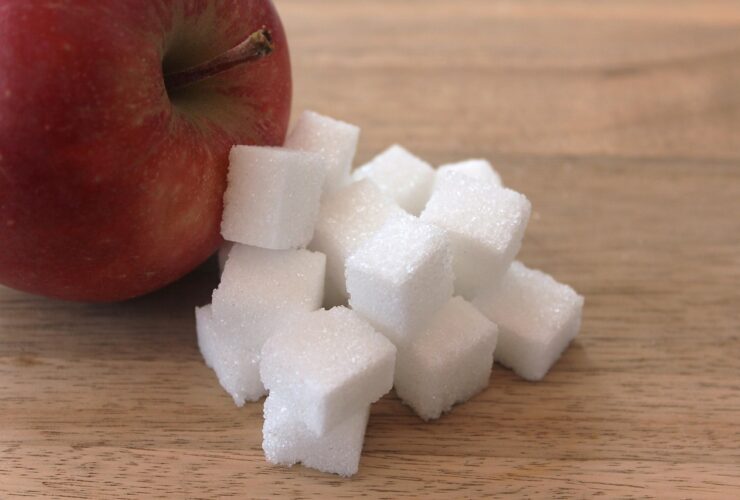In the world of health and wellness, nutrition advice can sometimes be confusing, and unfortunately, misinformation often spreads quickly. Myths and misconceptions about food and dieting are common, leading many people to make decisions that might not support their long-term health goals. As a yoga trainer and nutritionist, I’m here to debunk some of the most prevalent nutrition myths, so you can make informed, and healthier choices regarding your diet.
In this blogpost, we’ll uncover the truth behind common nutrition myths, explore the science that debunks them, and provide you with practical tips for achieving a balanced and sustainable approach to nutrition. Whether you’re a yoga enthusiast or just someone looking to improve your overall health, this guide will help you get a clearer understanding of what’s best for your body.
Myth 1: Carbs are Bad for You
The Truth: Not All Carbs Are Created Equal
One of the most widespread nutrition myths is that carbohydrates are inherently bad for your health, causing weight gain and sabotaging your fitness goals. This is simply not true. Carbohydrates are a primary source of energy, fueling everything from your brain function to your workouts and yoga practice.
The key to understanding carbs is recognizing the difference between complex and simple carbohydrates. Complex carbs—found in whole grains, legumes, fruits, and vegetables—are packed with fiber, vitamins, and minerals. These are slow-digesting carbs that provide sustained energy. On the other hand, simple carbs, such as those found in sugary snacks and refined grains, can spike your blood sugar and contribute to weight gain when consumed in excess.
Tip: Focus on consuming complex carbohydrates in your diet, as they offer numerous health benefits, including better digestion and improving energy levels.
Myth 2: Eating Fat Makes You Fat
The Truth: Healthy Fats Are Essential for Your Health
For years, fat was antagonized in the media, leading many to believe that eating fat would directly result in weight gain. However, the reality is that fat is an essential macronutrient, vital for hormone production, brain function, and cell repair. The key is choosing healthy fats in moderation, rather than avoiding fat altogether.
Healthy fats, such as those found in avocados, nuts, seeds, and oily fish, help support your body’s overall function and can even aid in weight management by keeping you satisfied for longer. On the flip side, transformed fats and excessive saturated fats, often found in processed and fried foods, should be limited in your diet due to their negative effects on your general health and well-being.
Tip: Include a variety of healthy fats in your diet, such as omega-3 fatty acids, and avocadoes to enhance brain function and promote overall well-being.
Myth 3: Detox Diets Are Necessary for Cleansing Your Body
The Truth: Your Body Already Detoxes Itself
Detox diets, cleanses, and fasting protocols are often marketed as the ultimate way to rid your body of toxins. However, your body is already equipped with natural detoxification systems, including the liver, kidneys, and digestive system. These organs work around the clock to filter out harmful substances and maintain balance within your body.
While it’s essential to support your body’s natural detox process by staying hydrated, eating a balanced diet, and exercising regularly (hello, yoga!), you don’t need expensive detox programs or juice cleanses. In fact, some detox diets can be harmful, leading to nutrient deficiencies and dehydration. Try your utmost best to stay off detox diets!
Tip: Focus on nourishing your body with whole, unprocessed foods, staying hydrated, and maintaining a regular exercise routine to support your body’s natural detoxification process.
Myth 4: Eating Late at Night Leads to Weight Gain
The Truth: Timing Isn’t as Important as What You Eat
A common myth in the nutrition world is that eating late at night will cause you to gain weight, simply because you’re consuming food closer to bedtime. While it’s true that some people might experience digestive discomfort from eating heavy meals late in the evening, the timing of your meals doesn’t necessarily determine weight gain.
What truly matters is your total caloric intake throughout the day (calorie in – calorie out) and the quality of the foods you consume. If you consistently eat more calories than your body needs, regardless of when you eat, you will gain weight. It’s important to focus on the overall balance of your diet, rather than obsessing over when you eat.
Tip: If you enjoy a late-night snack, opt for a light, balanced option like a handful of nuts or a piece of fruit, and avoid fried foods, overly processed or high-sugar foods.
Myth 5: All Plant-Based Diets Are Automatically Healthy
The Truth: Not All Plant-Based Foods Are Nutritious
Many people adopt a plant-based diet believing it’s a foolproof way to improve their health. While plant-based diets can be incredibly nutritious when done right, simply cutting out animal products doesn’t automatically make your diet healthy. Processed vegan foods, such as plant-based burgers, chips, and sugary snacks, can be just as unhealthy as their animal-based counterparts.
To ensure you’re getting the full benefits of a plant-based diet, focus on whole foods such as vegetables, fruits, legumes, whole grains, and healthy fats. Pay attention to your protein intake and ensure you’re getting all the essential nutrients, including vitamin B12, iron, calcium, and omega-3 fatty acids.
Tip: If you follow a plant-based diet, make sure to include a variety of whole, minimally processed foods to meet all your nutritional needs.
Myth 6: Supplements Are a Substitute for a Healthy Diet
The Truth: Whole Foods Are Always the Best Option
Supplements are often marketed as quick fixes for health problems, with promises to fill nutritional gaps in your diet. However, while supplements can be useful in certain cases, they should never replace a healthy, balanced diet. Whole foods are packed with a wide array of vitamins, minerals, fiber, and antioxidants that supplements simply can’t replace.
Relying too heavily on supplements can lead to nutrient imbalances and may even be harmful in some cases. It’s always better to get your nutrients from real, whole foods like carbohydrates, vegetables, fruits, lean proteins, and healthy fats. Supplements should only be used when necessary, such as when recommended by a healthcare provider.
Tip: Prioritize whole, nutrient-dense foods in your diet and use supplements only when needed, based on individual health needs.
Myth 7: Eating More Protein Will Make You Bulky
The Truth: Protein Helps with Muscle Repair, Not Bulkiness
There’s a misconception that consuming too much protein will automatically result in bulky muscles, but this is far from the truth. While protein is essential for muscle growth and repair, it won’t turn you into a bodybuilder unless combined with heavy strength training and a surplus of calories.
For most people, especially those who engage in regular physical activity like yoga or light strength training, protein helps repair muscles and supports healthy metabolism. Make sure you consume enough protein to support your muscle repair, it encourages a feeling of fullness that way you don’t over consume calories.
Tip: Ensure you’re getting enough protein to support your active lifestyle, but remember, balance is key. Aim for a variety of protein sources, including plant-based and animal-based options.
Nutrition myths are all around us, but it’s important to separate fact from fiction to make better, healthier choices. By focusing on a balanced, whole-foods-based approach to nutrition, you can optimize your health and wellness. Remember, there is no one-size-fits-all diet, and what works for one person may not work for another. The key is to find a sustainable, nourishing way of eating that suits your unique needs, lifestyle, and goals.
If you’re ever unsure about nutrition, working with a professional, like a nutritionist or dietitian, can help you create a personalized plan that supports your yoga practice and overall well-being. Stay informed, and don’t let myths dictate your path to health!
If you found this article helpful, be sure to check out our other resources on yoga, nutrition, and holistic well-being at Meelas Vitality Hub. Join our community and get expert tips, exclusive content, and the latest updates on living a vibrant, healthy life!
Namaste!



